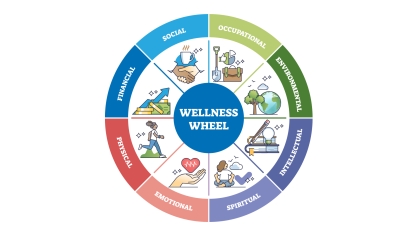Research Project Inspired by Sudden Death of Alumna Seeks to Uncover Burnout Triggers

Rutgers–Camden nursing professor aims to better support and strengthen the nursing workforce
The sudden and unexpected death of a young person by suicide creates a bleak landscape where it can feel impossible to make sense of the senseless. The April 2022 death of Hillary F. Herskowitz, 25, an alumna of Rutgers University School of Nursing in New Brunswick, remains difficult to understand for her family, friends, and colleagues. However, her passing is helping inspire research into potentially life-saving educational and organizational changes that may ensure increased self-care support is available for health professionals.
According to Assistant Professor of Nursing Catherine Stubin, who has a Ph.D. in nursing science, cases of burnout—caused by cumulative workplace stress—surged among health care professionals during the COVID-19 pandemic. She said contributing factors include excessive workloads, administrative paperwork burdens that eat into patient-care time, limited control over scheduling, and a deficit in readily available psychological support. Stubin said while there have always been social, cultural, and organizational factors contributing to burnout in the health care industry, these factors were heightened during the pandemic.
The recipient of a $5,000 faculty fellowship from the Senator Walter Rand Institute for Public Affairs (WRI), a research center based at Rutgers–Camden, Stubin is using the funds to gather insights into burnout and the prevention of burnout-related physical and mental illnesses.
The research is under the umbrella of the Hillary Project, an initiative named in Herskowitz’s honor. This inaugural study is set to be the beginning of ongoing initiatives regarding burnout that will bolster existing services, curricula, and new programs at the Rutgers School of Nursing–Camden.

“I have been a registered nurse for 40 years and a nurse educator for 25 years,” Stubin said. “I have seen firsthand what happens when nurses do not take care of themselves. The opportunity to work on the Hillary Project also spoke to me personally. A college-age loved one survived a suicide attempt after struggling with mental health issues. This is an opportunity to find out from our students, alumni, leadership, and practice partners how our school is addressing self-care, resilience, and the potential for burnout in the workplace.”
WRI conducts policy and practice-relevant research on social and community issues, such as public health, workforce development, food security, and much more. WRI also provides support to a variety of faculty and centers across Rutgers–Camden to conduct South Jersey-focused research.
“I am pleased we are supporting this vital research,” said WRI Director Mavis Asiedu-Frimpong. “Through this fellowship and Dr. Stubin’s research, we ignite a partnership between WRI and the School of Nursing–Camden to support our students in managing stress and burnout. We also positively impact the health care received by the people of South Jersey, because many of our nursing school alumni stay in our region as clinicians.”
The School of Nursing–Camden has become a leader in exploring the consequences of burnout. “It is a privilege to participate in the Hillary Project,” said School of Nursing–Camden Dean Donna Nickitas. “The Hillary Project is a way to re-ignite health, resilience, and well-being, providing much-needed support to the nursing and health care workforce. I am proud to honor Hillary’s memory and that of all nurses who lost their lives or experienced depression, burnout, or trauma from COVID-19.”
Stubin added that the nursing school has been layering self-care into its curriculum for some time. One example is the “Wellness Wheel,” a visual tool that prompts introspection into emotional, social, financial, physical, intellectual, and other factors. Working with the wheel can help students with goal setting and with adopting self-care and resilience strategies.

The research Stubin is undertaking through the WRI fellowship will provide both quantitative and qualitative analysis of the effects of burnout and recommendations on how to address it in the workplace.
The psychological well-being of students is paramount. It directly affects their educational progress and impacts their transition into the nursing profession.
Catherine Stubin
Assistant Professor of Nursing
Jane Massey Licata, a WRI advisory board member and teaching professor at Rutgers Law School in Camden, is the founder of the Hillary Project and a contributor of a $5,000 matching grant for Stubin’s research. Licata personally knew Herskowitz, who was a family friend for many years.
“I have been teaching undergraduate, graduate, and law students for more than 20 years, but during the pandemic, I saw that students’ education and careers would be forever impacted by this disruption to their lives,” Licata said.
Licata recalled that Herskowitz had been working as a staff nurse at the University of Pennsylvania and then briefly at Planned Parenthood when the effects of burnout seemed to change her outlook on life.
“Hillary did not die of COVID-19, but it was as if she gave up on life itself amid so much loss and death,” Licata said.
Licata noted that the change in Hillary’s usually positive outlook was unexpected.
“I knew Hillary as she grew into a kind and compassionate nurse who wanted to help others,” Licata said. “My expectation now is that the Hillary Project will offer a gateway of hope and help for health workers.”
If you or someone you know is experiencing a mental health crisis, dial 988 or text TALK to 741741. Mental health resources are available to Rutgers–Camden students via the Student Wellness Center.


